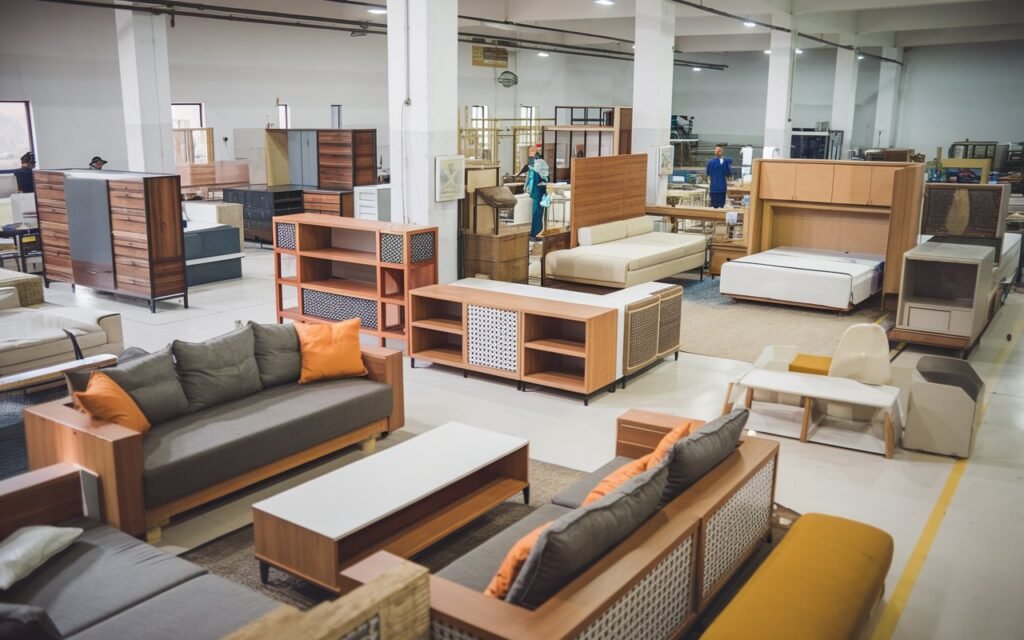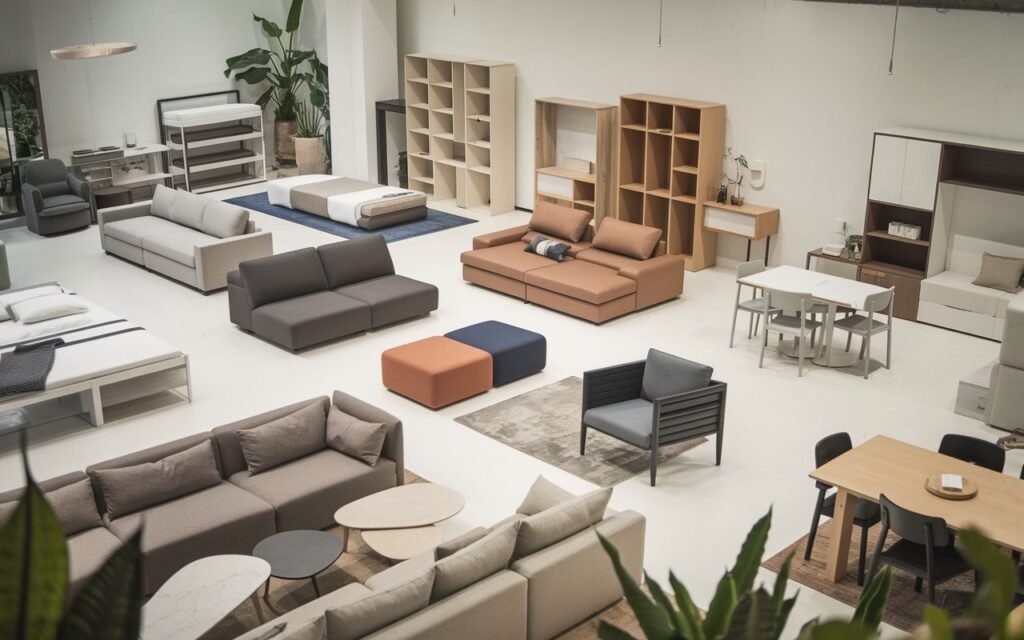In the current times, many industries are facing change, especially in India. The way we work, live, and interact has transformed, and this transformation has had a major impact on different industries. One such industry that stands at a crossroads is the furniture manufacturing sector. Businesses and manufacturers, including us at Shree Interior Wudtech, have adapted to new ways of working, but we also rely on decisions from the nation’s leadership to guide us forward. As we await decisive action from the government and industry leaders, we’re looking at the changes that are shaping our industry and the factors influencing the future of furniture manufacturing.

This blog will dive into some of the critical aspects of our industry in today’s scenario and what lies ahead for businesses like ours.
1. A Changing Industry Landscape
Furniture manufacturing has evolved in the past decade. Traditional furniture has made way for modern, modular furniture that meets the needs of today’s fast-paced lifestyle. At Shree Interior Wudtech, we have embraced modular designs, allowing us to create furniture that’s easy to move, set up, and maintain. This shift has helped us keep up with demand and serve the growing market for flexible furniture options.
However, as we focus on making modular furniture accessible, many challenges have emerged. These include supply chain issues, rising material costs, and fluctuating demand. Each of these challenges impacts how we manufacture, distribute, and price our products.

Why Modular Furniture?
The demand for modular furniture is rising because it offers flexibility and convenience. In cities like Mumbai and Navi Mumbai, people live in compact spaces, and modular furniture makes it easy to maximize every inch. From modular wardrobes to storage units and smart TV units, this type of furniture fits well in both homes and offices. But creating these pieces requires quality materials, skilled labor, and stable supply chains—all of which depend on broader economic policies and government support.
2. Challenges Faced by the Furniture Manufacturing Industry
The furniture industry in India, like many other sectors, is facing various challenges that are beyond our control. Some of these challenges have been worsened by global issues, while others are specific to our industry.
a) Supply Chain Disruptions
In recent years, supply chain disruptions have affected all manufacturers. Getting raw materials on time has become difficult, and costs have increased due to delays and transportation issues. The impact on furniture manufacturing has been significant because materials like wood, metal, and glass are essential for making quality products. Delays in the supply chain lead to delays in production, which impacts the overall availability of products in the market.
b) Rising Material Costs
The cost of raw materials is going up. From wood to metal and glass, each material we use is now more expensive than before. This affects pricing, as we need to balance affordable options for customers with the rising production costs. For businesses like Shree Interior Wudtech, this is a constant challenge. To manage these costs, we rely on policies that can stabilize or reduce the prices of materials, but until such policies are in place, we must find ways to manage our production efficiently.
c) Changing Consumer Demand
As people’s lifestyles evolve, their furniture needs change too. The trend for modular and compact furniture has gained popularity, but customers also want sustainable options. Meeting these demands means we need to explore eco-friendly materials and innovative designs. However, shifting to more sustainable practices requires investment in new technology and materials, which can be costly without government incentives or subsidies.
3. The Need for Decisive Government Policies
The furniture manufacturing industry can only grow when there is a supportive policy framework. As the nation decides on its path forward, industry stakeholders hope for policies that will address some of the challenges we face and support growth and innovation.
a) Support for Small and Medium Enterprises (SMEs)
Many furniture manufacturers in India are small or medium enterprises, including Shree Interior Wudtech. These SMEs need financial support and incentives to grow and compete in the market. With loans, subsidies, and training programs, small businesses can access resources that help them thrive. The government’s focus on supporting SMEs can encourage entrepreneurship in the manufacturing sector and create more job opportunities.
b) Encouraging Local Manufacturing
“Make in India” is a well-known government initiative, but to fully benefit from it, we need policies that make local manufacturing more affordable and practical. Lowering taxes on raw materials and providing incentives for local production will encourage manufacturers to source and produce locally, reducing dependency on imports. For Shree Interior Wudtech, this would mean fewer supply chain disruptions and more reliable access to materials, allowing us to deliver quality furniture to our customers more efficiently.
c) Investment in Technology and Innovation
The world of furniture manufacturing is not just about making tables and chairs. Today, technology plays a big role in how furniture is designed, manufactured, and distributed. With advancements in automation, smart materials, and sustainable practices, manufacturers can produce better, more eco-friendly products. Government support for technology adoption, especially for small businesses, would help the entire industry stay competitive and meet modern demands.
4. Sustainable Manufacturing: The Future of Furniture Industry
One of the most important changes in our industry is the shift towards sustainability. People today are more aware of environmental issues, and they want products that don’t harm the planet. This has led to a rising demand for eco-friendly furniture made from sustainable materials and processes.
a) Eco-Friendly Materials
Manufacturers are now using materials like bamboo, reclaimed wood, and recycled metals. These materials have a lower impact on the environment than traditional wood or plastic. At Shree Interior Wudtech, we’re exploring ways to incorporate such materials into our designs, making our products not only stylish but also sustainable.
b) Waste Reduction
Manufacturing processes can create a lot of waste, from wood scraps to metal shavings. By adopting new methods that minimize waste, we can make production more efficient and less harmful to the environment. Policies encouraging waste reduction in manufacturing would be beneficial for both the industry and the environment.
c) Energy-Efficient Processes
Many factories are now using energy-efficient machinery to reduce their carbon footprint. Investing in such machinery can be costly, but it saves energy in the long run and helps reduce the overall environmental impact. Government incentives for energy-efficient practices can encourage manufacturers to adopt these technologies, making the industry greener.
5. The Role of Innovation in Meeting Consumer Needs
In addition to sustainability, innovation is essential to meet the changing demands of consumers. Modular furniture itself is an example of innovation in design, providing flexible and functional solutions for modern homes and offices. But innovation doesn’t stop there. Today’s consumers want smart furniture that can connect to devices, move easily, and serve multiple purposes.
a) Smart and Modular Designs
At Shree Interior Wudtech, we focus on creating modular furniture that fits into any space, making it ideal for both large homes and compact apartments. As people move towards smaller living spaces, modular designs help them use every inch of space efficiently. We aim to keep innovating our designs to make our furniture even more adaptable.
b) Personalized Solutions
Consumers now look for furniture that reflects their personal style. By offering customizable options, manufacturers can meet this demand. Whether it’s a specific color, size, or configuration, customization is a trend that has changed the way furniture is made and sold. With the right technology, we at Shree Interior Wudtech can offer personalized furniture solutions that cater to unique tastes and preferences.
c) Digital Platforms and Online Sales
Digital platforms play a big role in connecting manufacturers with customers. Online shopping has made it easier for people to browse, compare, and buy furniture from the comfort of their homes. For manufacturers, it opens up a larger market and simplifies the sales process. As more people embrace online shopping, having a strong digital presence will be key for companies like ours.
Conclusion: What Lies Ahead for the Furniture Manufacturing Industry?
The furniture industry in India is ready for growth, but it needs strong support from policies and leaders to navigate the challenges ahead. Decisive action from the



